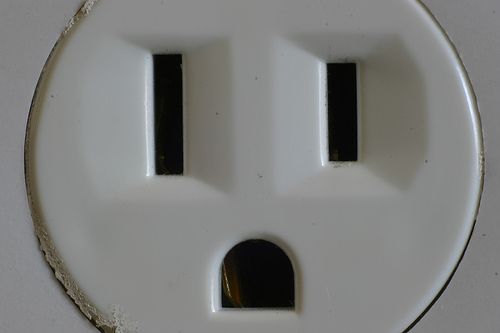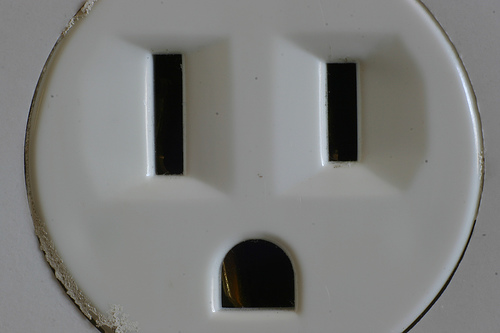Send your question to Umbra!
Q. Hi Umbra,
I know that the little trickle of electricity that so many appliances use even when they are “off” adds up to a significant amount of power. I also know that a power strip with an on/off switch can help. But there are places in my house where a power strip is pretty inconvenient. In the kitchen, I’ve begun using the test and reset buttons on the GFI outlet as on/off switches for the coffee maker and its little clock. It seems very handy — but I can’t help but wonder if in doing so I’m going to wear out the GFI outlet or undermine my efforts somehow. “They” say to test GFIs monthly, but if I effectively test it every day, am I going to be replacing it frequently? Might I conceivably mess it up through overuse to the point where it becomes an electrical fire hazard? Or have I stumbled across a quick and easy way to deal with trickling electricity?
Jonathan T.
Norwich, Vt.
A. Dearest Jonathan,
“They” do say to test the GFI or GFCI monthly, and as far as I can tell it’s because “they” don’t want you to be seriously electrocuted. “They” love you.
 Oh noooooo!grendelkhan via flickrGround Fault (Circuit) Interrupter outlets are those outlets in kitchens, bathrooms, and other potential wet locations that have the Test and Reset buttons between the two pluggy spots. They monitor electrical flow through the outlet when it is in use. Under normal conditions, the electricity should complete a circuit, with a certain number of milliamps leaving out one hot prong hole and returning through the neutral prong hole. The GFCI is predicated on the notion that if any of the milliamps leaving the outlet fail to return to the official neutral/ground within, they must have found a ground somewhere else.
Oh noooooo!grendelkhan via flickrGround Fault (Circuit) Interrupter outlets are those outlets in kitchens, bathrooms, and other potential wet locations that have the Test and Reset buttons between the two pluggy spots. They monitor electrical flow through the outlet when it is in use. Under normal conditions, the electricity should complete a circuit, with a certain number of milliamps leaving out one hot prong hole and returning through the neutral prong hole. The GFCI is predicated on the notion that if any of the milliamps leaving the outlet fail to return to the official neutral/ground within, they must have found a ground somewhere else.
That somewhere else could conceivably be a person, perhaps a person standing in a spot of water (as I once was when operating a dangerous secondhand toaster — zoinks). A tiny difference in the amount of amps leaving vs. returning activates a coil inside the GFCI, which then passes the bad news on to various other bits, ending in the physical severance of the electrical connection within the outlet. The outlet stops working, the appliance in question stops receiving electricity, and any nearby persons are spared horrible pain. GFCIs are calibrated to trip at about 5 or 6 milliamps — before you even feel a shock, much less cardiac arrest.
To wend our way to your actual question, there are a few potential problems with your use of the Test button as a phantom load reducer. As you say, you will wear the thing out more quickly than if you just tested monthly as we are meant to do. The part that will wear out is the part that senses a loss of amps in the circuit and shuts off power to the outlet. It might become way more sensitive to wee variations in current, and start shutting off when nothing is wrong, and perhaps shut off altogether if it is an outlet of recent vintage — in other words, become annoying and need to be replaced. Or, worse, it will stop sensing variations in current, but still let you access electricity. You may not notice that it has stopped, and be killed in a stupid accident involving a humdrum kitchen appliance and a puddle of toddler pee underfoot. (There is a way to determine if your GFCI is failing: a little diagnostic GFCI tester plug found at hardware stores.)
Other issues with this theoretically excellent idea is that some GFCIs may be wired so as to cut off power to other outlets down the line, monitoring not only themselves but their neighbors for a power imbalance. You’ve been shutting yours off and having no noticeable problems in other outlets, but other persons might shut off the power to three outlets in a row, maybe interrupting the baked beans down there in the crockpot.
So, to sum up: On the minor side, you would wear out your GFCI outlet and need to buy and install a new one. On the major side, you would be dead. I prefer you non-dead.
Stay tuned for my next column, which looks at some more promising alternatives.
Affectionately,
Umbra



